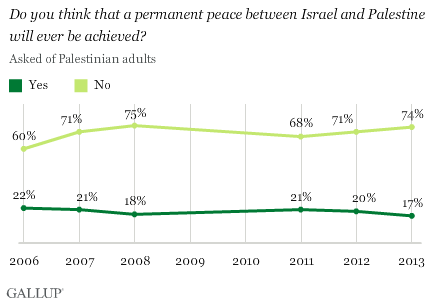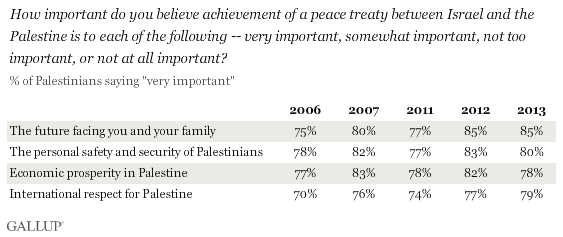BEIRUT -- Most Palestinians likely have low expectations for formal peace talks between Israelis and the Palestinians that are scheduled to take place in the coming weeks. Nearly three in four Palestinians surveyed in late May and early June do not expect a permanent peace accord will ever be realized. Fewer than one in five foresee it happening.

Palestinians have consistently been pessimistic about the possibility of peace for the past several years. This despairing attitude likely finds its roots in the attempts -- and failures -- to resolve this conflict, including the first Oslo Accords, which were announced almost 20 years ago. The Oslo Accords were often labeled as a historic turning point in agreeing to a formula of coexistence and presumed partnership between the two antagonists.
On the other side of the negotiating table, the majority of Israelis are also doubtful of ever reaching a permanent peace agreement, but they are less skeptical than Palestinians. More than half of Israelis interviewed in October 2012 said they do not expect peace to ever be achieved, while nearly three in 10 (29%) were optimistic and 13% did not know what to expect.
Most Palestinians See Peace as Vital to Their Future
Any deep-seated doubts about permanent peace do not overshadow the importance Palestinians put on peace to their future safety and security and Palestine's economic prosperity and international respect. Eighty-five percent of Palestinians see achieving a peace treaty as "very important" to the future facing them and their families. Slightly fewer, but still a substantial majority (80%), consider it very important to their personal safety and for the security of Palestinians.

A solid 78% see a peace treaty as key to economic prosperity. International respect for Palestine is another perceived benefit of a peace treaty, with 79% saying that is very important.
Implications
As the Palestinians and Israelis sit at the negotiating table, not only does the legacy of the longest deadlocked bloody conflict in the Middle East haunt them, but also the public skepticism that permanent peace will ever become reality.
The more apparent issues Palestinians consider as a top priority are agreements on border lines, release of Palestinian prisoners, freeze of settlements on the West Bank, and economic and military security issues. From the perspective of the average Palestinian, two decades have passed without any of these issues being successfully addressed either through mediated or unmediated negotiation. Against this mix of hopelessness of realizing permanent peace and the strong belief in the dividends of peace, a breakthrough may be in the hands of the current U.S. administration whereas all other previous have faltered.
For complete data sets or custom research from the more than 150 countries Gallup continually surveys, please contact us.
Survey Methods
Results are based face-to-face interviews with approximately 1,000 adults, aged 15 and older, conducted in May-June 2013 in the Palestinian Territories and in October 2012 in Israel. Results for the 2006, 2007, 2011, and 2012 surveys are based on interviews with approximately 1,000 adults each year. For results based on the total sample of national adults in the May-June survey, one can say with 95% confidence that the margin of sampling error is ±3.7 percentage points. In addition to sampling error, question wording and practical difficulties in conducting surveys can introduce error or bias into the findings of public opinion polls.
For more complete methodology and specific survey dates, please review Gallup's Country Data Set details.
